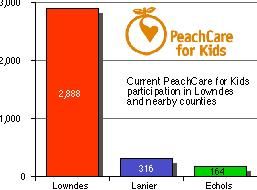PeachCare suffers from financial illness
Published 11:38 pm Friday, December 29, 2006

- VDT PeachCare
VALDOSTA — Approximately 260,000 children throughout the state of Georgia receiving insurance coverage through the PeachCare for Kids program may lose that coverage if temporary funding made available only through May 2007 for State Children’s Health Insurance Plans (S-CHIP) is not extended until the end of the federal fiscal year in October 2007.
Georgia is facing the repercussions of a federal fund shortfall of $131 million, which is needed to continue PeachCare for Kids until October.
Unfortunately, the state cannot make up the difference for the federal shortfall, according to Georgia Department of Community Health Commissioner Dr. Rhonda Medows. State law prohibits the use of 100 percent of state funds for programs that are both federal and state funded, and the shortfall amount itself is so great that even if the law was not in place, the task of finding $131 million to carry the program through Oct. 1, 2007, would be near impossible, Medows stated.
S-CHIP is a federal program administered in partnership with states to provide heath insurance coverage for children in low-income, working families who would otherwise be uninsured, according to Medows. The state receives matching federal funds to operate the PeachCare program. Currently, the distribution relies heavily on the federal contribution, which makes up 72 percent of the total operating funds, leaving the state with only 28 percent of the burden, according to the DCH Web site.
The issue of funding shortfalls for S-CHIP is nothing new, according to Medows.
Without federal funding for the shortfall, PeachCare for Kids would have run out of funds in March 2007 and all 260,000 children in the program would have lost their heath care coverage, according to the Georgia Department of Community Health.
However, the funds needed to carry the program through May were made available Dec. 9 when the 109th Congress provided a temporary fix to the shortfall before adjourning in the 11th hour.
This new law will divert all unused FY05 S-CHIP funds — approximately $145 million — for redistribution to the six states anticipating shortfalls before June, according to a report released by the Congressional Research Service. Those states include Illinois, Maryland, Massachusetts, New Jersey and Rhode Island.
Hard-hit Georgia
If Congress fails to act entirely during the upcoming session, Georgia will be one of the hardest hit states in the country.
Under the new legislation, the Department of Health and Human Services is required to redistribute the unspent dollars “in the order in which such states realize monthly funding shortfalls.” Thus, states facing the earliest shortfalls to their S-CHIP in 2007 will used funds, taking them from other states anticipating deficits later in the year.
Georgia was expected to receive approximately $18.4 million in redistributed funds this fiscal year, but under the new law that figure is expected to drop to $1.2 million, according to an analysis released by the CRS.
That $1.2 million is merely a “drop in the bucket” when faced with a $131 million shortfall, Medows stated.
Medows also stated, however, that she was assured by an official with the Centers for Medicare and Medicaid Services that the new law would grant Georgia additional funds early next year, but another agency official stated that the new law has just been released and the agency is still crunching its effects on
individual states.
Facing drastic cuts
The hope of DCH and medical providers throughout the state is that the 110th Congress will appropriate the remainder of the $131 million when they reconvene in January.
Congress must address three issues in January, according to Medows. Those issues include, (1) the remainder of the 2007 federal funding shortfall faced by states, (2) re-authorization of S-CHIP and, (3) revision of the S-CHIP funding formula to include the cost of maintaining coverage for children already in PeachCare for Kids as well as uninsured new eligibles entering the program.
“That’s a lot to ask, but it’s what we need,” Medows said.
Federal funding for the program is allotted based on the number of uninsured children. However, once children are in the program they are counted as being insured.
“The better job we do as a state, the lower our count of uninsured is and the lower our allotment,” Medows said. “Our initial goal is to get them coverage, but we need to keep them covered.”
Medows added that the current formula almost works to punish those programs enrolling the most children by taking more funding away each time a new child is enrolled.
Even if Congress does re-authorize the program and make up for the funding shortfall, if the funding formula remains unfixed, Medows stated that the program would remain, but face drastic cuts.
Currently, families living at or below 235 percent of the federal poverty level — which equates to approximately $47,000 per year for a family of four — are eligible to enroll in PeachCare. In order to make up for cutbacks, Medows stated that the eligibility requirement could be raised to serve only families at or below 150 percent of the federal poverty level.
“That would be very drastic,” Medows said.
Other options for cutbacks include increasing premiums paid by enrolled families, reducing benefits provided by cutting back on dental, vision and therapy services or to move some children to Medicaid.
However, Medows stated that without the necessary funding, more than one of these options would have to be utilized in order to make up for the deficit.
“It is vitally important that Georgia’s Congressional delegation hears how important the PeachCare for Kids program and S-CHIP funding is to us,” Medows said. “The need is for parents of these children, providers of these children and people who represent them to send a message to their congressmen and senators to show them how important it is.”
Many Congressmen have already joined the efforts to create awareness of the need for action to keep Georgia children insured. Medows has already traveled to Washington, D.C., to meet with national delegates to discuss the issue and stated that the responses have varied.
Georgia Senators Johnny Isakson and John Barrow have become the strongest support for the program. Both Senators know the program, the issues and what needs to be done and have been working to make other members of Congress aware, according to Medows.
Barrow has also dropped a bill addressing the shortfall, and Isakson is following suit with a bill addressing the shortfall, re-authorization of the program and a reworking of the funding formula, according to Medows.
Senators Saxby Chambliss and Isakson have also included their names, along with a number of other members of Congress, on a letter sent to President Bush Nov. 27, which stated, “We urge you to ensure that the budget provides adequate federal funding for states to both maintain their existing S-CHIP caseloads and for states to cover all children and pregnant women up to 200 percent of the federal poverty line.”
Georgia currently ranks fifth nationally in numbers of enrolled children in S-CHIP programs with only California, New York, Florida and Texas enrolling more. Locally, Lanier County currently has 316 PeachCare participants, Echols County currently has 164 and Lowndes County has 2,888 participants enrolled in the program.
To find out who represents you in Congress, visit www.congress.org/congressorg/state/main/?state=GA/.
To send a letter to Georgia’s U.S. Senators write to: Sen. Saxby Chambliss, 416 Russell Senate Office Building, Washington, D.C., 20510; or Sen. Johnny Isakson, 120 Russell Senate Office Building, Washington, D.C., 20510.





